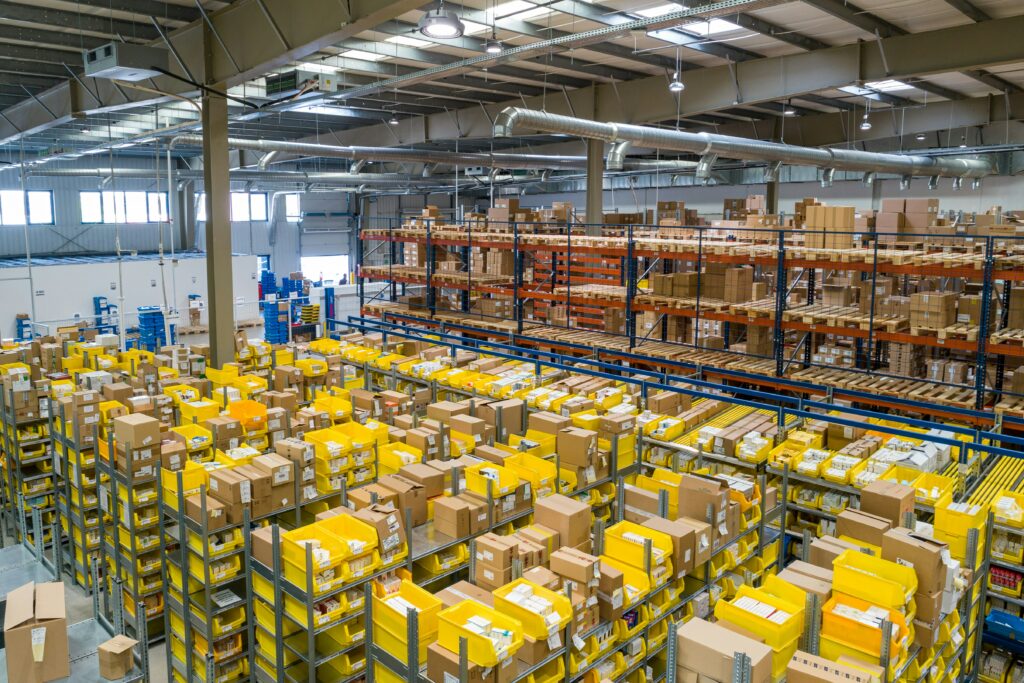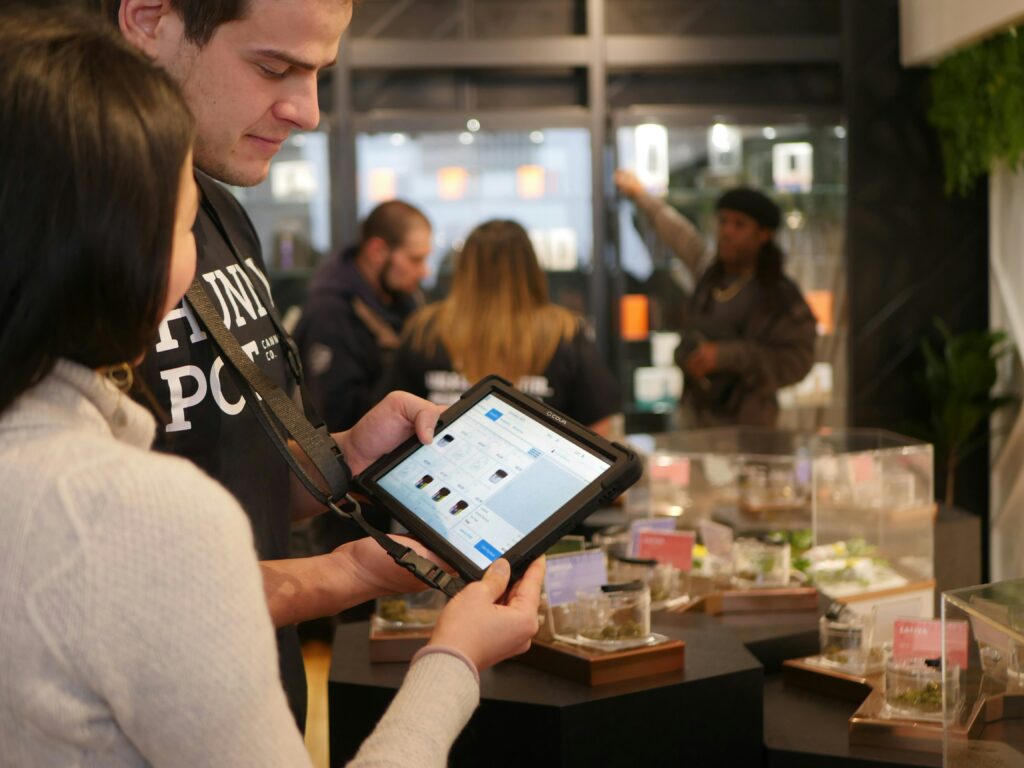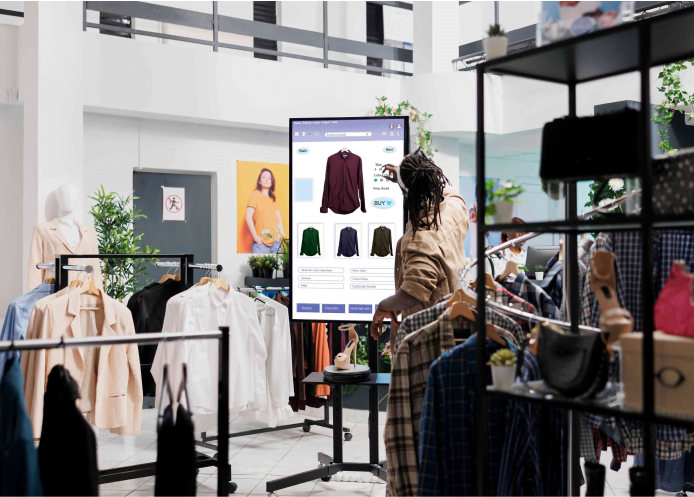Mercari Shakes Up Retail with Its First Physical Store in Los Angeles
Welcome to the latest buzz in eCommerce, where the digital marketplace Mercari takes a bold step into the physical retail world by launching its first U.S. store in sunny Los Angeles. This move is more than just a retail expansion; it’s a blend of unique finds with an authentic Californian vibe, setting a new benchmark for online-to-offline business models. In this article, we’ll dissect how this strategic move by Mercari is not just expanding its market presence but also revolutionizing the consumer experience by integrating the convenience of online shopping with the tangible benefits of a physical store.

Mercari: Pioneering a Hybrid Shopping Experience
The launch of Mercari’s physical storefront is a significant step, echoing a growing trend where online giants are exploring brick-and-mortar possibilities. This development is particularly noteworthy when considering Mercari’s roots as a popular Japanese online marketplace known for its eclectic mix of products. By opening a physical store, Mercari is not only increasing its brand visibility but also offering a tangible shopping experience that complements their established online presence.
For eCommerce professionals, whether you’re a marketer in Los Angeles or an e-commerce manager brainstorming your next big move, understanding the implications of this development is crucial. It reflects a shift in consumer expectations and a new direction in eCommerce strategy, where the physical and digital converge to enhance customer engagement and satisfaction.
Stay tuned as we explore deeper into how Mercari’s new venture is a game-changer in the retail space, setting the stage for a discussion on how businesses can harness the synergy between online and offline channels to captivate and retain customers. This exploration is not just about a new store; it’s about setting a new standard in the retail experience.
Impact on eCommerce Dynamics
As we dive into the mechanics of Mercari’s strategy, eCommerce leaders can glean insights on integrating physical stores into their digital-first business models. This move by Mercari could potentially shift how businesses think about growth and customer interaction in the digital age. Get ready to delve into a discussion full of insights that promise to enrich your understanding and inspire innovative approaches in your ventures.
Are you prepared to adapt and thrive in this evolving business landscape? Let’s explore how Mercari’s latest initiative might just be the roadmap for future retail endeavors. Stay informed, stay inspired, and maybe, rethink how your business interacts with the physical and digital worlds.
A Glimpse into the Future: Mercari’s New Physical Store in Los Angeles
Picture this: you’re in the bustling streets of Los Angeles, and suddenly, you encounter a store unlike any other. This isn’t just any retail venture; it’s Mercari’s first physical store in the U.S., bringing with it a touch of Japanese uniqueness. With shelves filled with items directly from Japanese sellers, each product not only offers quality but tells a compelling story from a distant land. This not only changes the way Los Angeles shops but also introduces a novel experience right on its streets.
Amazon’s Pivot Towards Sustainability with Amazon Resale
On the flip side, retail giants like Amazon are not standing by idly. The recent transformation of Amazon’s Warehouse into the Amazon Resale reflects a strategic pivot towards sustainability. This rebranding underlines a shift in consumer habits towards more sustainable and conscious purchases, emphasizing the importance of giving returned and slightly used items a second chance at life.

The Intersection of Cultural Uniqueness and Sustainability
Why is this shift significant, especially for eCommerce entrepreneurs and marketers? The entry of platforms like Mercari into physical retail, coupled with the transformation of established players like Amazon, signifies a broader change in the retail landscape. On one end, Mercari offers an escape from the monotony of mass-produced goods by offering unique products imbued with cultural stories. On the other, Amazon Resale caters to the eco-conscious consumer, promoting environmentally friendly shopping practices.
Both businesses are tapping into the growing consumer desire for not just products, but products with a purpose and provenance. This is crucial for eCommerce marketers to understand as it shapes the future narrative of retail—connecting customers not only to products but to stories, cultures, and sustainability.
Embracing the New Retail Narrative
The launch of Mercari’s physical presence in Los Angeles is more than just an expansion; it’s a cultural integration, offering a slice of Japan in every item. Similarly, Amazon Resale’s initiative is reshaping the narrative from buying to reusing, directly addressing the burgeoning trend of reducing waste. This shift places an emphasis on the story behind each item—whether it’s a vase carrying the essence of Japan or a refurbished gadget saving electronic waste.
This evolution in online and physical retail exemplifies a deeper, more interconnected marketplace. The choices we make as consumers are increasingly reflective of broader societal shifts towards diversity and sustainability. Every item purchased is not merely a transaction but a statement of preference for a more connected and responsible world.
The next time you are shopping online or visit the new Mercari store in Los Angeles, think about the broader impact of your choice. Each purchase is not just a individual action but a part of a global narrative of interconnectedness and responsibility—a trend that is reshaping the retail industry at its core.
An Overdue Overhaul: Understanding the White House and FTC’s New Consumer Protections
Welcome back to our ongoing exploration of the transformative policies reshaping our everyday experiences. Today, we delve into a pressing issue that, while ubiquitous, tends to lurk unnoticed — the recent regulatory changes aimed at enhancing consumer protection. These reforms, propelled by both the White House and the Federal Trade Commission (FTC), are set to redefine the landscape of digital commerce and customer service.

Why the Sudden Focus on Hold Times and Fake Reviews?
Imagine the anticipation of unboxing a new tech product you found online, only to discover it’s a far cry from the glowing online reviews. Or recall the frustration of endless hold times during a customer service call. It’s clear: the digital age’s conveniences can sometimes be double-edged swords.
The new initiatives by the White House attack exactly these problems — long phone wait times and deceptive online reviews. However trivial these issues might seem at first glance, they have significant implications for consumer rights and business integrity in an increasingly online world.
Fabricated reviews, often generated by bots or paid imposters, do not merely skew individual purchasing decisions; they disrupt the entire marketplace. By manipulating perceptions, these reviews harm reputable businesses and mislead consumers, tarnishing trust in online ecosystems. Meanwhile, excessive hold times reflect poorly on a business’s regard for customer time and satisfaction, often leaving a lasting negative impression.
The FTC Steps In: A Hammer Down on Deceptive Practices
The FTC’s robust response to these issues has been to set a clear, uncompromising ban on fake reviews. This action, detailed extensively in a report on SERoundtable, extends beyond a mere slap on the wrist. Classified under deceptive marketing practices, this crackdown involves potential hefty fines and stricter regulations, compelling businesses to maintain transparency or suffer significant penalties.
Such decisive action is not solely about punishing dishonesty but signals a much-needed shift towards proactive safeguarding of consumer interests in digital environments. By homing in on the root causes of consumer dissatisfaction, regulatory bodies like the FTC aren’t just enforcing rules; they are essentially molding a fairer trading space.
The Broader Impact and What It Means for You
For consumers, these changes spell a more secure, reliable online shopping experience. Knowing that there’s an active effort to combat fraudulent practices offers a layer of reassurance in digital dealings. For businesses, the message is crystal clear: the era of transparency and honesty is not just forthcoming—it’s here.
These regulatory changes are likely to set a global benchmark, aspiring towards higher standards worldwide. As digital commerce continues to evolve at a breakneck pace, such consumer protections remind us of the responsibilities that come with technological advancements and regulatory power.
As you next navigate an online purchase or dial a customer service line, bear in mind the shifting paradigms of consumer rights. The evolving digital marketplace isn’t just about buying and selling but is also a platform for empowerment and accountability. Keep a discerning eye, remain inquisitive, and embrace your rights as a proactive consumer. The digital age is yours to command, and informed choices are the best tools at your disposal.
The Critical Need for Cybersecurity in the Mercari Physical Store Launch in Los Angeles
Excitement buzzes around the recent announcement of Mercari’s physical store launch in Los Angeles, a bold move expanding from their rooted online presence into a tangible retail environment. As thrilling as this move is, it calls to attention the ever-pressing issue of cybersecurity in eCommerce operations, a lesson echoed by recent events involving Alibris.
Mercari, known for its vibrant online marketplace, makes a strategic leap but also ventures into cybersecurity complexities faced by both digital and physical retailers. Take, for example, the recent incident with Alibris, a well-established online bookstore that encountered a substantial security threat leading to a complete website shutdown. This situation underscores the critical importance of robust cybersecurity measures not just online but in any retail extension.

Insights from the Alibris Incident
Alibris had to take drastic measures by taking their platform offline to protect the integrity of their site and the privacy of millions of users—a decisive, yet disruptive choice. This reflects a broader necessity within the eCommerce industry. As reported during their outage, safeguarding customer information is not an added feature but the backbone of trustworthy customer relations.
The cybersecurity measures echoed by Alibris’s experience are crucial for companies like Mercari as they expand physically. Encryption, regular software patches, intrusion detection, and proactive threat monitoring are not options but necessities. In particular, as Mercari opens its doors physically, integrating these digital fortifications into physical locations will determine the seamless and secure fusion of their customer experiences across both realms.
Expanding While Protecting
The lesson here is crystal clear. As Mercari enters the Los Angeles market with its physical store debut, the emphasis on cybersecurity cannot be underestimated. A security breach, similar to that faced by Alibris, could impair not only the digital façade but also the in-store operations that heavily rely on digital technologies for inventory, sales processing, and more. Thus, the integration of stringent cybersecurity measures will define the backbone of Mercari’s operational integrity and customer trust in this new venture.
Effective cybersecurity in the eCommerce world extends beyond the online domains, seeping into the physical outlets that rely heavily on digital backbones. This strategic integration ensures a safer shopping experience and reinforces customer trust, critical as Mercari steps forward in their groundbreaking endeavor in Los Angeles.
As industry observers and participants, we watch closely how Mercari’s initiative unfolds, bearing in mind the pivotal role of cybersecurity, a lesson well noted from Alibris’s incident. This is not merely about preventing inconvenience but fostering a secure environment where consumer trust is not merely expected, but assured.
In conclusion, as the digital and physical retail worlds converge, the commitment to robust cybersecurity must be unwavering. Given the Mercari physical store launch in Los Angeles, enhanced security protocols are not just beneficial, but imperative for safeguarding against the sophisticated landscape of threats that modern retail faces.
AI in Retail: Not Just Fiction Anymore
Once confined to the realm of science fiction, Artificial Intelligence (AI) is rapidly reshaping how we shop, turning once-fanciful ideas into practical tools that enhance the shopping experience. With leading tech giants like Google launching AI-driven initiatives, the line between fiction and reality continues to blur in the exciting world of eCommerce.

The Era of AI-Powered Shopping
Case in point: Google’s recent unveiling of an AI-powered update for Android phones including the sophisticated Pixel 9. This leap towards more personalized shopping experiences allows your smartphone to act almost like a personal assistant, predicting your needs and making timely recommendations. Imagine receiving suggestions about where to find discounts on your favorite snacks right when you need them—this is the type of shopper-centric intelligence that AI is bringing to the retail table.
Distinguishing AI Utility from Hype
However, with the surge in AI capabilities, it’s crucial to discern practical applications from mere fluff—a concept highlighted in the discussion on ‘AI Snake Oil’. While AI can offer substantial benefits such as optimizing price strategies or tailoring product recommendations, there’s a growing need to identify and filter out the overloaded promises that offer little real-world utility. As tempting as it may be to dream of a future where our devices read our minds, understanding the realistic capabilities and limitations of AI remains vital.
The Power of Data in AI Learning
To truly appreciate how AI is evolving in eCommerce, consider its learning mechanism. By analyzing extensive datasets—views, purchases, and customer reviews—AI systems can detect emerging patterns, like a sudden spike in sales of glow-in-the-dark sneakers. This data-driven insight enables AI to anticipate market trends and customer preferences with impressive accuracy, often leading to timely and contextually relevant shopping suggestions.
Impact on eCommerce: A Double-Edged Sword?
As we integrate more AI into eCommerce platforms, the impact on both consumers and businesses continues to expand. For shoppers, AI promises a more intuitive and convenient shopping experience. For retailers, AI offers tools to better understand customer behavior, manage inventory, and optimize marketing strategies. Yet, this technological integration also brings challenges, particularly concerning privacy, data security, and the potential homogenization of shopping experiences.
In sum, while the proliferation of AI in retail settings like AI enhancements in “Mercari physical store launch Los Angeles” is poised to make shopping easier and more personalized, stakeholders must navigate these advances thoughtfully. By maintaining an inquisitive and critical perspective, we can harness AI’s potential responsibly, ensuring it serves to enhance rather than complicate the shopping landscape.
Mercari’s Bold Move: Launching a Physical Store in Los Angeles
Welcome to the latest exciting update in the world of e-commerce—a sector that never sleeps and is constantly evolving! Today, we’re delving into Mercari’s innovative leap from digital to physical with the launch of its first-ever brick-and-mortar store in Los Angeles. This strategic shift not only diversifies Mercari’s offerings but also sets a fascinating precedent for online-first businesses.

A Seamless Blend of Online Convenience and Physical Experience
The launch of Mercari’s physical store is a game-changer for the brand, known primarily for its robust online marketplace that simplifies buying and selling items from consumer to consumer. By opening a physical location, Mercari is testing the waters of offline engagement in a predominantly online model. This move could potentially harness the best of both worlds—combining the tactile, sensory experience of in-store shopping with the convenience and reach of online platforms.
Revolutionizing Retail Integration: What this Means for the E-commerce Landscape
What’s particularly riveting about Mercari’s venture into physical retail spaces is the potential shift in consumer interaction and the overall e-commerce ecosystem. This hybrid model might encourage more online platforms to consider similar transitions, blurring the lines between digital and physical retail further.
Furthermore, Mercari might set new trends in how physical stores operate by integrating innovative technologies to streamline the shopping experience, such as advanced check-out systems or AR tools for product trials. It’s all about enhancing customer engagement and smoothing out the logistical bumps that online-only businesses often face, like returns and pickups.
Customer Experience at the Forefront of Mercari’s Strategy
The introduction of a physical store allows Mercari to elevate its customer service by offering instant gratification to consumers who prefer shopping in-store, and providing a tangible space for resolving queries and facilitating smoother transactions. This strategic move is not just about selling products but creating a community space that fosters deeper brand connections and loyalty.
This bold expansion by Mercari into physical retail not only underscores the growing trend of online businesses establishing offline presence but also highlights the evolving nature of consumer expectations and market dynamics. It invites other e-commerce entities to rethink their strategies and possibly explore hybrid models that could drive future growth.
As e-commerce continues to morph, Mercari’s physical store launch in Los Angeles could mark a significant shift towards a more integrated, multifaceted shopping experience that others in the digital realm could soon follow.
Always stay tuned to the latest in e-commerce innovations, and don’t miss exploring how each change might influence your shopping habits, whether you’re an industry insider or a casual consumer. The landscape is changing, ensuring exciting times ahead!
Are You Ready for the Next Big Shift in E-commerce?
As we wrap up this exploration into Mercari’s strategic foray into physical retail, it’s clear that the boundaries of digital commerce are expanding. What this means for consumers and other e-commerce platforms is still unfolding. For all you thinkers out there, whether you are planning your business strategy or simply staying informed, these innovations play a crucial role in shaping the future of commerce.
Keep an eye on how platforms like Mercari innovate and adapt, as these developments will likely inspire and dictate the e-commerce trends of tomorrow. Until then, stay curious and innovative, and, most importantly, prepared to embrace the seamless integration of digital and physical retail environments.
Reflecting on Key Moments in eCommerce This Week
In our comprehensive roundup this week, the spotlight was truly stolen by Mercari’s physical store launch in Los Angeles. This significant move not only marks a revolutionary step for the brand but also sets a fascinating precedent for the integration of online and offline retail in the ever-evolving eCommerce landscape. The initiative reflects a growing trend where digital-first companies explore brick-and-mortar avenues to enrich the customer experience.
Meanwhile, Amazon continues to push the boundaries of eco-conscious shopping with its Resale initiative. This program not only promotes sustainability but also positions Amazon as a leader in the green commerce sector, potentially reshaping consumer habits globally.
The advancement of AI in shopping and the fresh regulations to enhance online shopping security are set to transform how we interact with online marketplaces. This week has truly been a testament to the dynamic and rapidly changing world of eCommerce.

Join the Discussion on Mercari’s Move and More
We’ve dissected some of the week’s most thrilling developments in eCommerce—each offering a glimpse into the future of shopping. But what do these changes mean for the typical shopper and the small to medium eCommerce business owner?
With Mercari branching out into a physical store in Los Angeles, we’re curious: how do you see the blend of physical and digital retail spaces influencing your shopping habits or business strategies?
Will Amazon’s green initiatives inspire you to consider more sustainable shopping or selling practices?
And how might the latest cybersecurity measures affect your trust in online transactions?
We’d love to hear your thoughts, experiences, and predictions. Dive into the conversation below and let us know how you perceive these evolving dynamics will shape the future of eCommerce. Your insights not only enrich our discussions but also help us all stay ahead in the digital curve.
Remember, staying informed and adaptive are key components to thriving in the eCommerce landscape. Let’s keep pushing the boundaries and exploring new possibilities together!
What’s Next?
Make sure to tune in to our next podcast for more up-to-date news and strategies and check out Blikket.co for continued coverage on these topics. While you’re there, explore our extensive resources and articles that dive even deeper into the realms of eCommerce innovations.
Your engagement and feedback fuel our journey through the fast-paced world of eCommerce. Don’t forget to leave your thoughts in the comments section below—let’s keep the conversation going!










